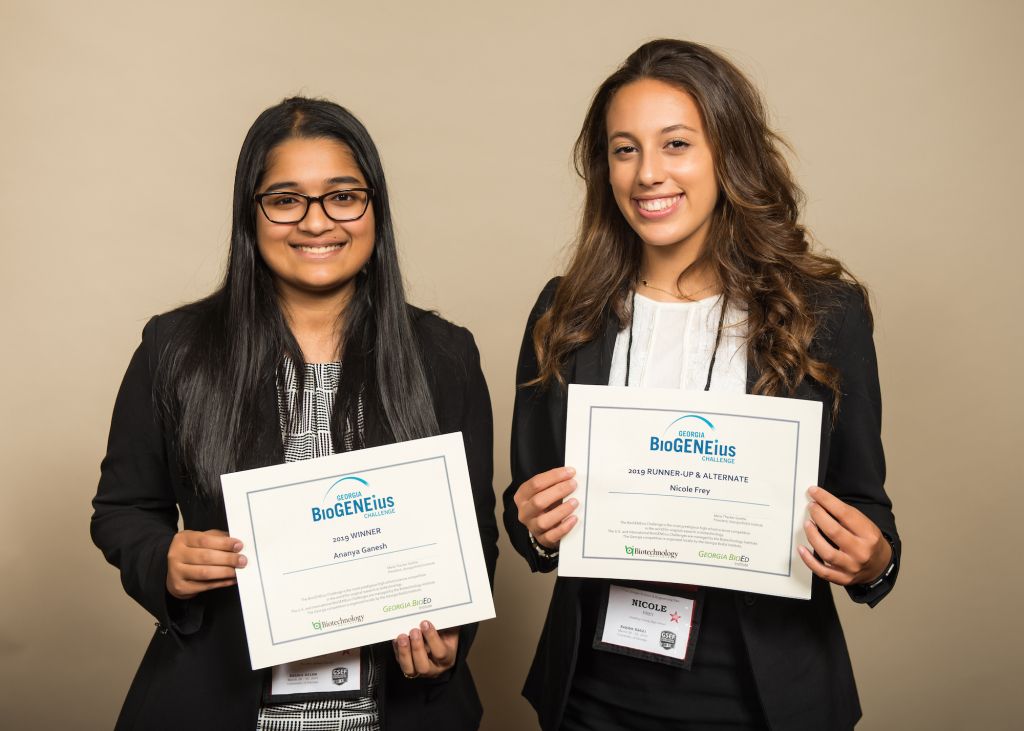BioGENEius Challenge
An original independent science research competition.
Through their preparation for a science competition, high schoolers gain an intimate knowledge of the scientific research process, from hypothesis generation and data analysis to paper writing and poster presentation. These skills are immensely valuable not only in STEM competitions but also in general scholarly pursuits.
How to Participate
What is the Georgia BioGENEius Challenge?
An original independent science research competition. Through their preparation for a science competition, high schoolers gain an intimate knowledge of the scientific research process, from hypothesis generation and data analysis to paper writing and poster presentation. These skills are immensely valuable not only in STEM competitions but also in general scholarly pursuits.
Who can apply?
High School students (grades 9 – 12) enrolled in biology or science related courses in any public, private, or home school within the state of Georgia. The Georgia BioGENEius Challenge will take place Friday, April 4, 2025, during the statewide Georgia Science and Engineering Fair (GSEF) to be held at the Classic Center in Athens, GA.
Challenge Categories:
- Healthcare
Projects for consideration for the Global Healthcare Challenge focus on the intended or anticipated outcomes of novel work in healthcare-related sciences, not the process or processes used to achieve them. Example projects could include but are not limited to:
Basic and translational systems knowledge (mapping genome elements, new molecular pathways, cell-cell interactions, etc.); druggable targets; novel proteins or small molecule therapeutics, vaccines: drug delivery; bioproduction of therapeutics/vaccines; nanobiotechnologies; medical devices; diagnostics; data analytics (AI/computational bioinformatics modeling/convoluted neural networks/health data IT application) all must be related to human health.
- Sustainability
Projects for consideration for the Global Sustainability Challenge focus on the intended or anticipated outcomes of agricultural applications' work, not the process or processes used to achieve them. Example projects could include but are not limited to:
Genetic or other manipulations to crop plants to allow for optimal growth under adverse conditions (temperature, soil depletion, drought, insects, etc.); beneficial symbiotic relationships to enhance yield; soil improvements; disease control; value-added foods for human and animal benefit; improvements in animal health and reproduction; food security; data analytics (AI/computational bioinformatics modeling/convoluted neural networks all related to agricultural biotechnology.
- Environment
Projects for consideration for the Global Environment Challenge focus on the intended or anticipated outcomes of the work impacting industrial and environmental issues, not the process or processes used to achieve them. Example projects could include (but are not limited to):
Bio-based degradable materials; bioremediation and other waste reduction/conversion efficiencies; marine-based products (not human health-related); new or improved biofuels production; biological processes for materials production (resource or waste conservation); reducing toxic emissions and greenhouse gases; data analytics (AI/computational bioinformatics modeling/convoluted neural networks all related to industrial and environmental biotechnology.
How do I apply?
Please access the application here. The application deadline is Friday, March 28th.
What do I win?
If you are selected as the winner of a BioGENEius competition you will be invited to attend the Georgia Life Sciences Summit, taking place August 26-27 in Atlanta. In addition, you could receive the opportunity to attend the International BioGENEius Challenge, co-located with another industry conference to be announced.
For more information about the Georgia BioGENEius Challenge, contact Megan Heaphy, mheaphy@galifesciences.org..
Past Winners
List of Services
-
2025
Winner: Bhavya Alapati, Fulton County Schools Innovation Academy: “A novel method of identifying strokes using a device she created called SpectroStroke, a small-scale spectrophotometer, to detect homocysteine, an amino acid product that is associated with stroke”
Runner-Up: Shelby Kendrick Paulding County High School: “Ability of Aspergillus terreus, a fungus found in soil, to degrade pre-treated polypropylene plastic (PP)”
-
2024
Winner: Sanan Khairabadi, Statesboro High School: “Identifying candidate enzymes for LDPE degradation through complete genomic analysis of LDPE-degrading Pseudomonas”
Runner-Up: Eugene Kang, Harrison High School: “Investigating the Anticarcinogenic Effects of Uvularia perfoliata”
-
2023
Winner: Michelle Li, North Oconee High School: “Exploration of Novel Capsule Depolymerases From Bacteriophage To Combat Antibiotic Resistance in Klebsiella pneumoniae”
Runner-Up: Deeksha Khanna, Chamblee High School: “Identification of Cell-Free DNA Methylation Signatures as a Potential Genomic Biomarker of Alzheimer's Disease”.
-
2022
Winner: Mokshith Mannuru, South Forsyth High School: “Identifying the common functions of genes linked to Autism"
Runner-Up: Varun Sendilraj, Lambert High School: “DFUCare: A Deep-Learning Based Mobile App for Diabetic Foot Ulcer Monitoring”
-
2021List Item 1
Winner: Priya Soneji, Milton High School: "Autonomously Tracking Organisms in Three Axes at Microscopic Resolution"
Runner-Up: Asmi Kumar, Milton High School: "FollowMe: AI to Revolutionize Cortical Visual
Impairment Therapy"
-
2020List Item 2
Winner: Shreya Ramesh, Milton High School: “Identification of Auditory Biomarkers for Neurological Disorders”
*Shreya advanced to win the top prize at the International BioGENEius competition.
Runner-Up: Krish Wadhwani, Denmark High School: “Broadening the Scope of Synthetic Antibody Mimics: Dementia Target-Based Novelty Solution System”
-
2019List Item 3
Winner: Ananya Ganesh, The Westminster Schools: “A Novel Approach to Assessment and
Classification of Pulmonary Function in Early Onset Scoliosis”
*Ananya advanced to win the GenePool Competition at International BioGENEius.
Runner-Up: Nicole Frey, Paulding County High School: “Cloning of Serratia marcescens chiA gene as a Biocontrol Alternative for Plants Targeted by Pathogenic Fungi”





